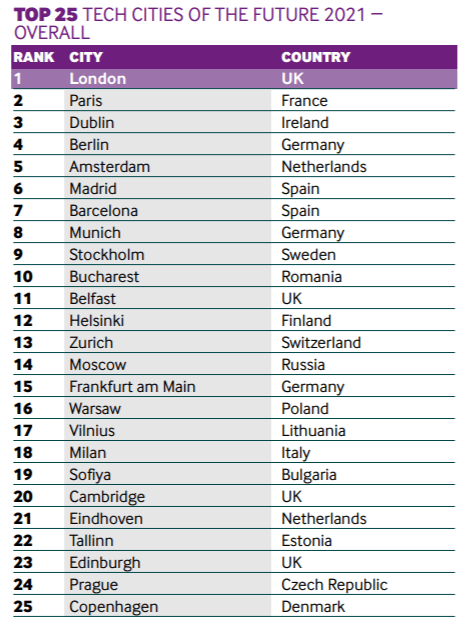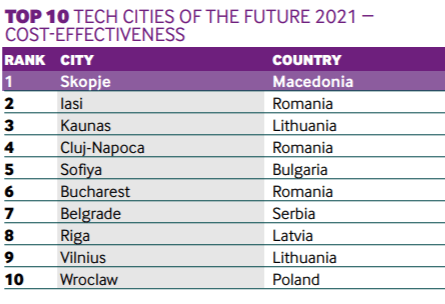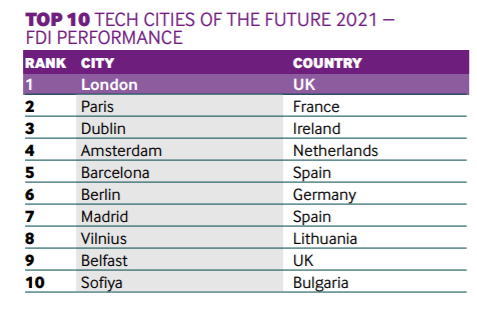Five Southeastern European cities have been listed in the rankings of the fDi Intelligence division of the Financial Times and digital business media The Next Web as top tech cities of the future. The Romanian capital – Bucharest – is tenth in the overall ranking, followed by Bulgaria’s first city – Sofia, which is nineteenth. They are outperforming cities such as Edinburgh, Cambridge, and Copenhagen.
North Macedonia’s capital Skopje has been outlined as the most cost-effective tech city of the future. Serbian first city Belgrade and the Romanian city of Cluj are also among the top cost-effective tech destinations of the future.
The methodology
The five categories for determining the tech cities of the future are Economic Potential, Innovation & Attractiveness, Foreign Direct Investment (FDI) Performance, Cost-Effectiveness, and Startup Environment. The data for these categories was gathered from 76 locations across Europe. The participating cities could receive up to 10 points for each data point. As noted in the report, the points were weighted by importance to the FDI decision-making process to compile the subcategory rankings.

© fDi x TNW Tech Cities of the Future 2021/22
SEE’s positioning: a comparative perspective
Compared to data from the previous edition of the report, Bucharest has climbed down in the ranking, going from seventh to tenth, based on its overall performance in the five categories. Sofia has climbed up from the twentieth position for the last year. The Bulgarian capital has also improved its position in terms of cost-effectiveness and has substituted Bucharest in the FDI ranking.
According to the analysis, when it comes to the broad picture, Southeastern European cities rank high in terms of cost-effectiveness. For this category, apart from Skopje, Romanian Cluj-Napoca is fourth, followed by Sofia, Bucharest, and Belgrade (fifth, sixth, and seventh, respectively), making the presence of the SEE regional hotspots noticeable in the ranking.

© fDi x TNW Tech Cities of the Future 2021/22
Sofia is the only regional hub present in the Fоrein Direct Investment performance category, taking over the tenth position on the list. London, which attracted 366 out of the 975 UK FDI projects, topped the list for this category.

© fDi x TNW Tech Cities of the Future 2021/22
The gap between the Bulgarian and the British capital is noticeable. According to data from Bulgarian National Bank, in 2020 Bulgaria’s foreign direct investment amounted to €561.7M.
In contrast, the Guardian cites the most recent data from the UK’s Office for National Statistics, stating that the value of foreign direct investment into the UK was £36B in 2019, or around €42B (Ed. note – the media also outlines the decrease in FDI investments, as the respective amount for 2018 was £66B or over €77B).
The missing statistics
No Southeastern European city is among the top 10 locations for three of the five categories – “Economic Potential”, “Innovation and Attractiveness”, and “Startup Environment”.
Leading cities, such as London, Paris, Berlin, and Amsterdam, have more developed ecosystems than the ones of Southeastern European cities. The categories of the fDi report take into account factors, including the funding attracted by tech companies, the concentration of well-developed companies, and the amount of investment flowing inside the country. Other important information includes quality of education, economic development, and the number of patents in software development and engineering fields.
However, The Southeastern European ecosystem continues to develop. In June 2021, while doing an overview of the first half of the year, The Recursive team counted rounds of total value surpassing €1B, a number that is likely higher given that the financial parameters of multiple deals in the region were not disclosed.
The featured SEE cities from the fDi ranking are also progressing towards becoming technological hotspots in the region:
- Sofia has been recognized by the international community as the most cost-effective fintech city in the world for 2019/2020.
- BroadbandDeals.co.uk classifies Bucharest as the best city for remote working for 2020. The Romanian capital is home to a flourishing startup community. According to the Romanian Venture Report, in 2020, investors made 59 VC announcements.
- Cluj was appointed a project leader in healthcare innovation and AI within the European Innovation Area at the Global StartUp Summit for 2020. The city also has over 16% of the software industry in Romania, coming second after Bucharest.
- North Macedonia has climbed up from 84th to 57th place in the Global Innovation Index during the past three years.
+++How close is the SEE region to become a corporate R&D hotspot?+++








